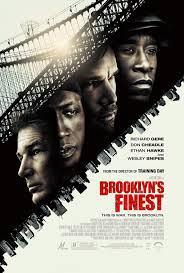 It is always instructive to see how popular culture treats half of the human race. Brooklyn’s Finest – a 2009 all-star-cast cop drama is remarkably telling. To wit, according to the film if you are a woman you are either A) evil, B) pregnant or
It is always instructive to see how popular culture treats half of the human race. Brooklyn’s Finest – a 2009 all-star-cast cop drama is remarkably telling. To wit, according to the film if you are a woman you are either A) evil, B) pregnant or
C) a prostitute.
These are the only three female types that appear in this 132 minute film. The pregnant character is the spouse of Sal (Ethan Hawke) the drama’s loose-cannon Italian Catholic copper who keeps stealing drug money to try to feed and house his massive brood (we never get an exact headcount but they have at least five kids and wifey is pregnant with twins). Of course, the wife/mother doesn’t have any agency. She carries a laundry basket. She has asthma. She is an invisible, suffering presence whose allergic reaction to the mold in their crappy house puts her in hospital and drives her husband to dangerous, self-destructive behavior in his attempt to fulfill the “man as provider” trope.
Notably, the pregnant and evil stereotypes are represented by precisely one woman each. In this fascinating parallel universe even typecast women are like snow leopards. Ms Evil is a career-driven harridan with a severe blonde bob and a power suit. She doesn’t even get a real name, just “Agent Smith” (Ellen Barkin) and her role is to foil the nearest thing the picture has to a hero – undercover officer Tango (Don Cheadle). She is a nasty racist bitch, dropped into the drama without benefit of backstory. Tango has to be restrained from attacking her when she says: “just because I’m in the jungle doesn’t mean I have to clean up monkey shit”. That’s the last we hear or see of her.
Finally, prostitutes, quite a selection of whom traipse through the picture. Two of them even have names. One is Chantel (Shannon Kane), a dusky beauty who services Eddie (Richard Gere’s anti-hero protagonist). She is beautiful, manipulative and likes being a whore. We know this because she declines when Eddie, who’s old enough to be her father, asks her to run off with him. The other prostitute valuable enough to get a name is Sarie (Sarah Thompson) a mute, drug-addled mess brutalised by nasty black men. Eddie, who’s idea of “serve and protect” is letting women get beat up because they’re in the wrong precinct and sulking in his squad car instead of answering “all units” calls, watches her get smacked around on his way into the brothel but turns the other cheek. Later, he sees her on a missing persons notice. Alerted that this abused female body is, in fact, a person, he has a burst of conscience and goes to rescue her. The only word she speaks is her name. Thus assured that she is a “missing person” and therefore (unlike an ordinary prostitute) worth saving, Eddie throws down on the pimps.
This is instructive as Eddie’s victory over the black menace summarises the film’s racial and gender politics. Women make up about two percent of the population in this fictitious New York City and, as described, are either evil, pregnant or prostitutes. The remaining 98% of the population forms a pyramid. At the bottom are bad black guys or black bad guys. They are anonymous, bulky, brutal, ignorant and get killed with monotonous regularity. (There is, it should be noted, one non-bad black guy who Sal who chases down and punches in the mouth. Because that’s what you get for being black in NYC.)
The next level of the hierarchy is crooked white guys, embodied by Sal, whose fertile loins drive him to criminal behavior. It is interesting that Sal, whose status as a white cop sets him up as the good guy in any film made by a God-fearing American, is made into an “other” by being a devout Roman Catholic. He goes to confession, wears a crucifix, and has rosary beads dangling from his rear view mirror. Right before the climactic scene where he does a murderous one-man raid on a drug den Sal spends some time praying, just to remind the audience that although he’s a white cop he’s still acting queer and therefore his impending death is acceptable.
Sal’s buddy Ronny (Brian O’Byrne) represents the ideal-type white cop – pragmatic, professional and Protestant. He tries to stop Sal, fails, and winds up accidentally-on-purpose murdering Tango, the only good black character in the film. This is ironic and not Ronny’s fault because Tango was undercover and had a gun. Everyone knows the NYPD is entitled to shoot armed black men on sight. So, as ever, all the black characters die.
Eddie, however, walks away from both his police career and his fling with vigilante justice unscathed by the violence and chaos that has killed every other main character in the film. From this we learn that no matter what, the white Protestant patriarchal male always triumphs. It may not be a glorious but he gets out with limbs and vital organs intact, unlike the women/blacks/Catholic/Others.
